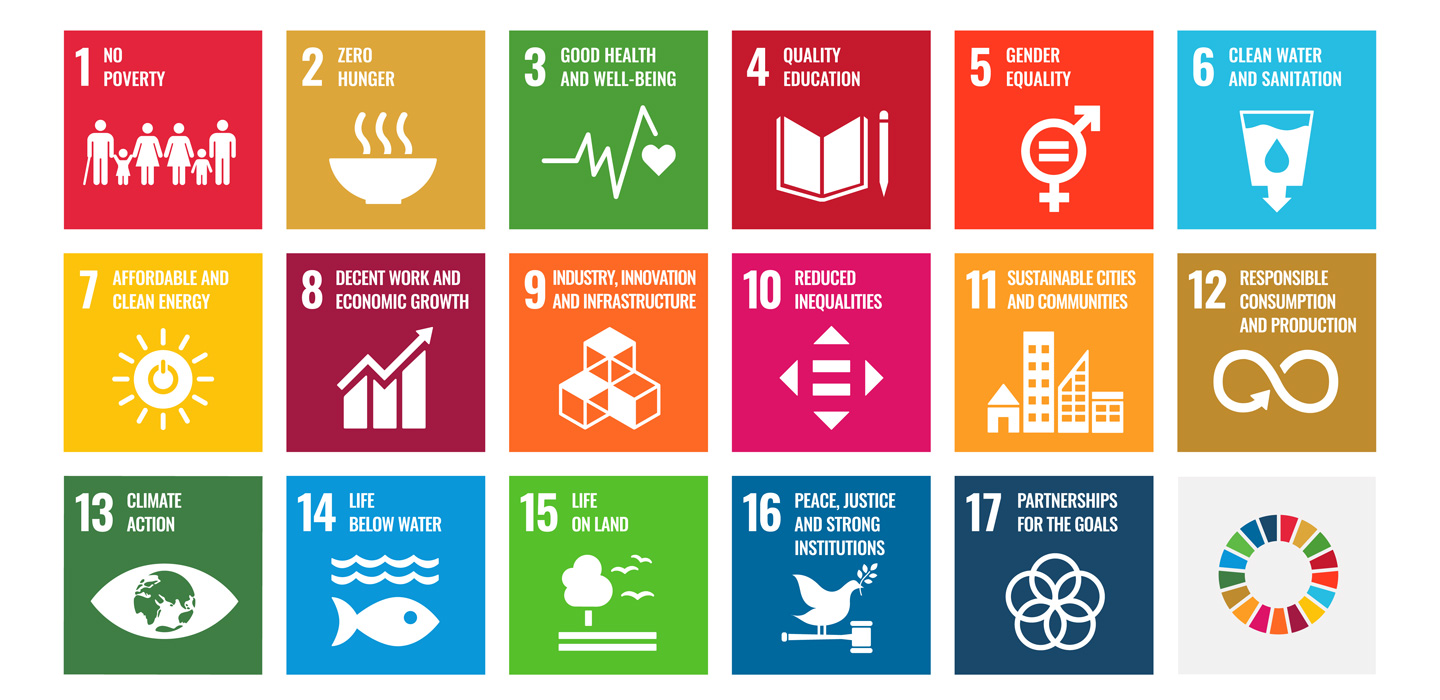IFAD and the SDGs
IFAD and the SDGs banner

IFAD and the SDGs
IFAD and the SDGs
17 goals to transform our world
The 2030 Agenda is a commitment to “leave no one behind”. It applies to all countries and spans social, environmental and economic issues. This commitment is most salient in rural areas as shocks, such as climate change and the COVID crisis, disproportionately affect rural communities.
To overcome these challenges, IFAD supports small-scale rural producers and connects them to markets and services so they can produce more, earn more and, in doing so, sustainably transform rural communities.
IFAD projects make a tangible contribution to 16 of the 17 the Sustainable Development Goals (SDGs). This comprehensive impact reflects IFAD’s integral role in development, providing broad and sustainable finance.
IFAD monitors, reports on and maps direct and indirect contributions to the SDGs through the Results Management Framework (RMF) and the Sustainable Development Finance Framework.
How IFAD contributes to the SDGs
Given IFAD’s focus on transforming rural areas and investing in small-scale producers, SDG 1 (no poverty) and SDG 2 (zero hunger) are particularly pertinent. For example, over the IFAD11 replenishment period (2019-2021), 77.4 million people increased their income, while 62.4 million people improved their production.
IFAD contributes to SDG 4 (quality education) by providing poor rural people with the tools and skills for business development.
By helping people access technology that sequesters carbon or reduces greenhouse gas emissions, IFAD promotes affordable and clean energy (SDG 7).
Through access to business development services, IFAD fosters inclusive, diversified and productive rural economies that create opportunities for decent work, higher incomes and economic growth (SDG 8).
To link rural producers to markets, IFAD constructs, rehabilitates or upgrades roads, thus contributing to SDG 9 (industry, innovation and infrastructure).
IFAD invests in sustainable agriculture to preserve and restore natural resources while increasing the resilience of farming systems to a changing climate (SDG 13).
Find out more about IFAD’s results and how they contribute to SDGs
Related news
Related news
La CEPAL y el FIDA proponen redefinir el concepto de ruralidad para mejorar las políticas públicas e impulsar la agenda de desarrollo socioeconómico
La Comisión Económica para América Latina y el Caribe (CEPAL) y el FIDA proponen una nueva aproximación al concepto de ruralidad en México y América Latina con el objetivo de focalizar la acción pública para reducir las desigualdades y avanzar en la consecución de los Objetivos de Desarrollo Sostenible.
UN Food Systems Summit +2 Stocktaking Moment
The fight against hunger has stalled according to the latest figures that the UN released last week, with 122 million more people suffering chronic malnourishment since 2019. The challenges to eradicate hunger and poverty are many. Yet, without financing for food systems transformation, the Sustainable Development Goals (SDGs) and climate targets will remain out of reach.
High-level UN delegation to visit farmers and review progress of rural development projects in Egypt
A high-level delegation of Executive Board members and senior staff of the International Fund for Agricultural Development (IFAD) began an official one-week visit to Egypt today, to observe the impact of IFAD's investments in the country.
Related blogs
Related blogs
Why camelids are key to a better future in Bolivia and beyond
Why has the UN declared this year the International Year of Camelids? IFAD’s Country Director for Bolivia, Daniel Anavitarte, explains why you should care about these extraordinary mammals – and why they’re key to sustainable rural development in South America and beyond.
How can International Financial Institutions invest to ‘’build back better’’?
Given the already-high levels of poverty and vulnerability faced by small-scale rural producers, the pandemic has hit them and their families particularly hard. So, what should be the priorities for organisations, like IFAD, in the coming years?
China’s remaining challenges in reducing poverty
Next year China is hoping to announce that they have eradicated extreme poverty - but what are the challenges that China would need to deal with after 2020?
Related publications
Related publications
Unleashing the Catalytic Power of Donor Financing to Achieve SDG 2
This report presents the findings and recommendations of an enquiry into sustainable finance in agrifood systems conducted by the Global Donor Platform for Rural Development.
Indigenous Peoples and the United Nations' Rome-based Agencies working together to achieve the Sustainable Development Goals
Achieving a Zero Hunger world (SDG 2) is at the heart of the mandates of the three Rome-based UN agencies: FAO, IFAD and WFP.
Research Series Issue 64: How the adoption of drought-tolerant rice varieties impacts households in a non-drought year: Evidence from Nepal
Stress-tolerant rice varieties (STRVs) are bred to be high yielding and tolerant to climate shocks such as drought.